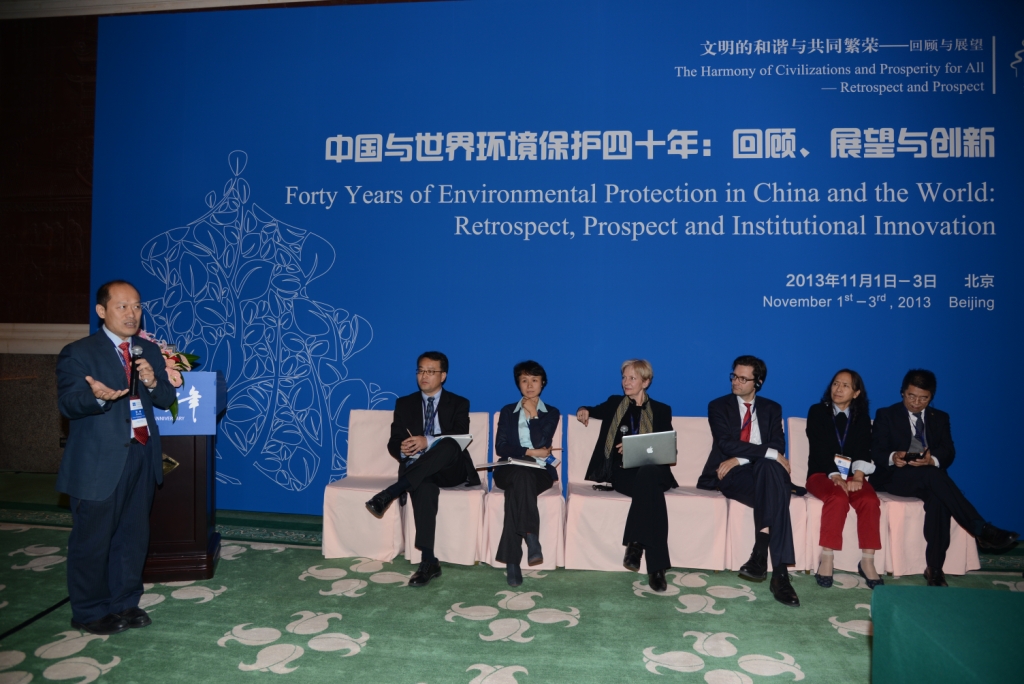
The second part of “Media, Public Participation and Environmental Protection” session is roundtable discussion. The host of the discussion is Director JiaFeng from Center for Environmental Education & Communications (CEEC) ofMinistry of Environmental Protection of China; seven participants are:HuJincao from CCTV; ZhuHongjun from Southern Weekend; LiuXinsheng from Texas A&M University; Isabel Hilton from China Dialogue; DuShaozhong from Beijing Environment Exchange, ZhangKejiafrom TNC China and Helmut Kranzmaier from Communication & Network Consulting AG, Germany.

Fig. 1 Roundtable Discussion
The first question proposed by MrJiaFeng was “how to promotepublic participation?”.Several key factors or strategies are recommended by participants for promotion of public participation. Firstly, mobilize public resources, and reinforce details about the events such as story telling and statistics that provide in-depth understanding about the environmental events. Secondly, build more active leadership to reshape the institutional strategies such as more space for media report, increase transparency of public information, increase government supports, application of commonly used media instruments to build more formal communication between the decision makers and the public. Thirdly, increased participation and recognition of NGOs and other social groups are critical part of public participation. In order to motivate participation of these public institutions, clear articulation of the values of the participation and providing access to information about the environmental events are key factors. Fourthly, institutional buildings for public participation with well-developed institutional arrangements to formalize and legal recognition of the public participation
Then, the host presented the second question for the participants: how to full play the role of supervision by press and media? The key points addressed by the participants are as follows. Firstly, supervision and monitoring from the media is critical though entail more strategic plans to develop self-protection; while on the other hand, media may deliver the real information to public and let the public provide the supervision. Secondly, in reflecting public concerns and expression of thoughts from the relevant institutions, it is critical that media provide more protection and appreciation to their thoughts.Provision of more access to information for the media can also increase their understanding of the position of the government institutions in this process of information exchange.Thirdly, in-depth and comprehensive analysis of the events and combine the findings with New Media such as social interactive media to promote the results.Finally, it is critical to have regular understanding and discussion between government institutions and media to synthesize a common understanding about the environmental issues or events.
Limited by the timeline, Prof. Jia brought out the last question on how to broken the puzzles of “lose-lose”/ “all lose” decision making. On this challenging topic, MsZhang Kejia thought the non-protesting principle proposed by TNC would deliver more innovative approaches and solutions to the environmental issues, which build more cooperative dialogue between decision makers and the public. MsIsabel Hilton pointed out that government should prevent public from being affecting by false information and set uniform safety standard for large-scale projects.MrHelmut Kranzmaier insisted that dialogues among the stakeholders should be based on trust,and gaining such trust requires true reflection and narratives of the events.
The discussion is concluded by Professor Zhang Shiqiuwith the remark by stating the acceptances of any feedbacks from all sides, so that more constructive dialogue can build to solve the associated issues. Therefore, such dialogue should be based on more democratic and mutually understanding cooperation to increase the publication participation and extend the full potentials of medial role in environmental protection.